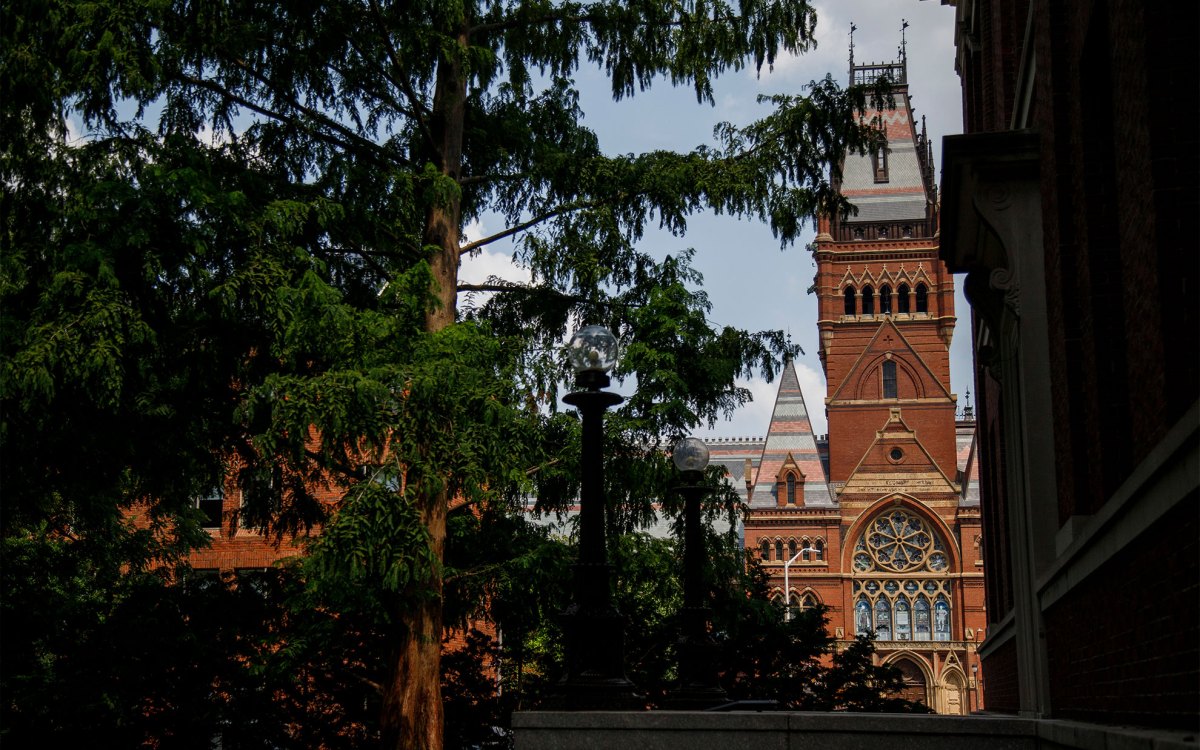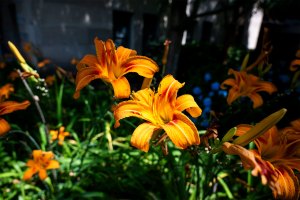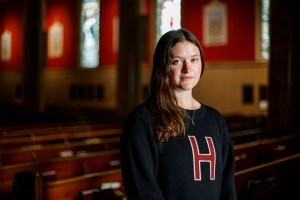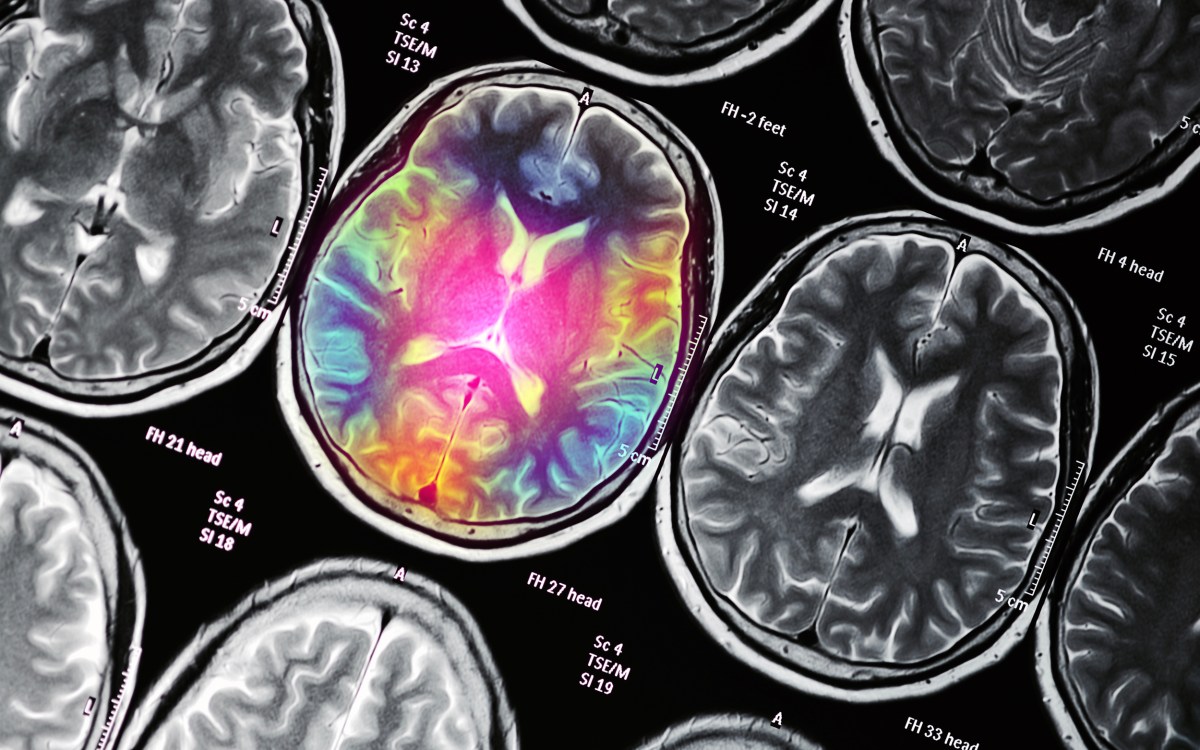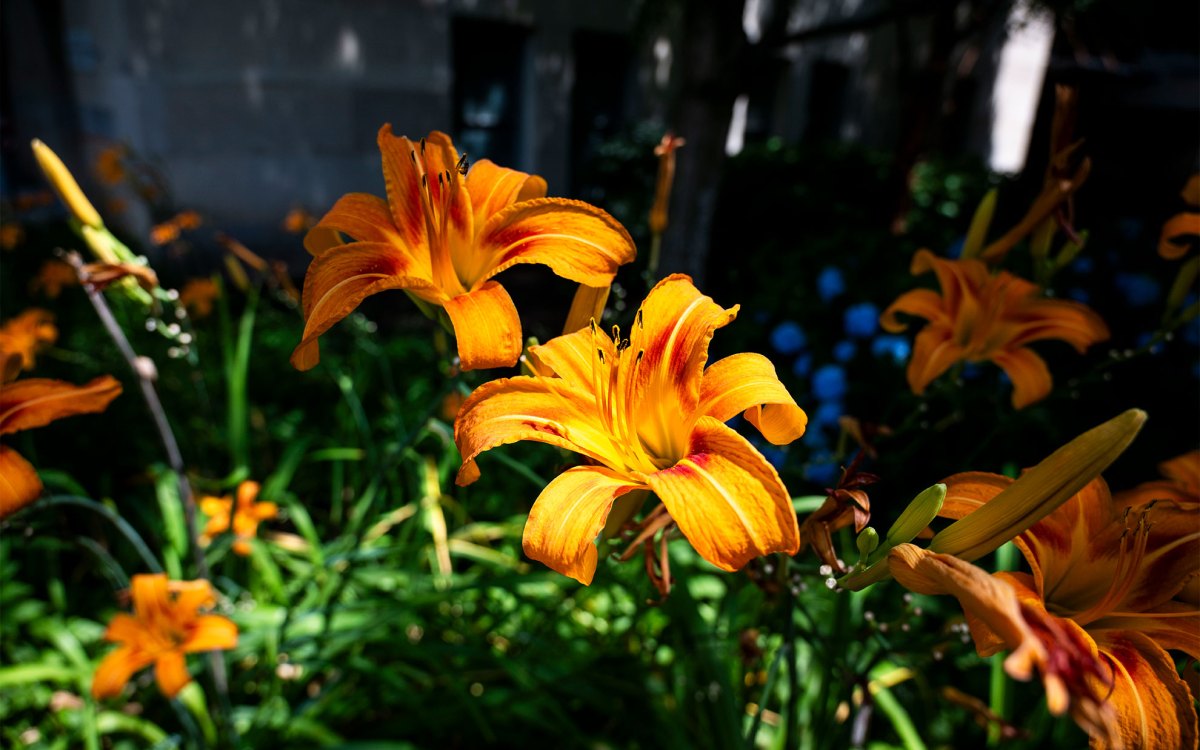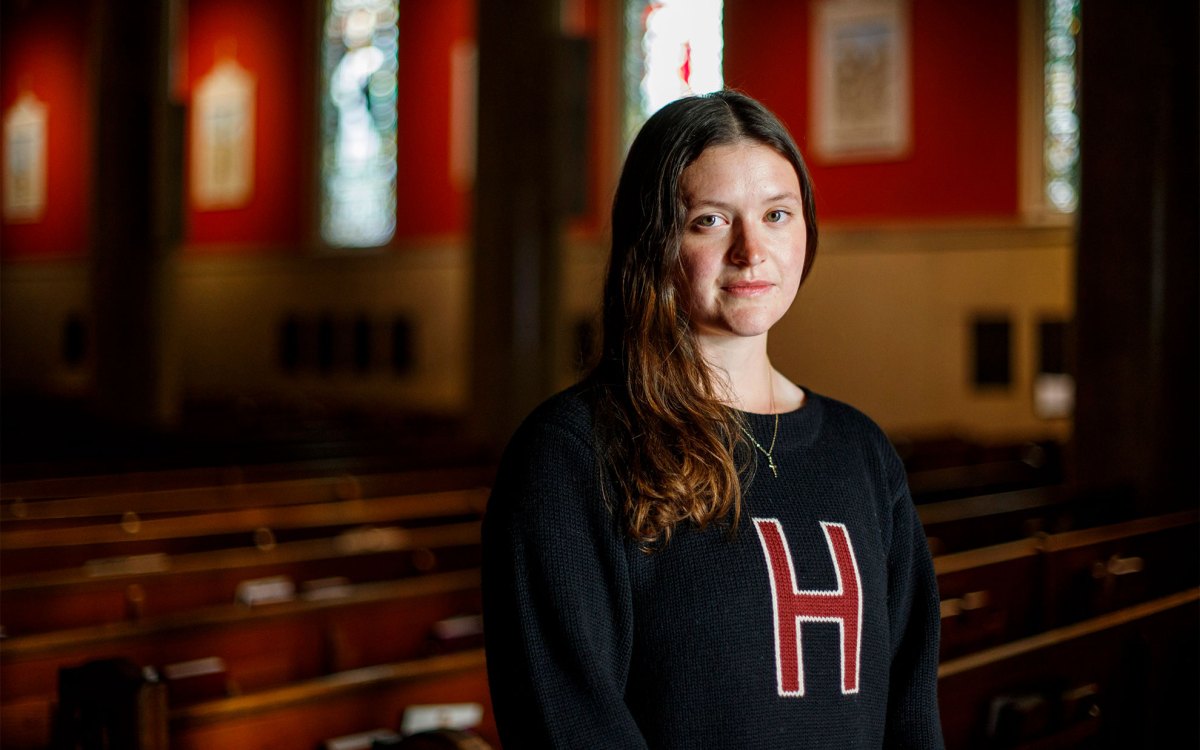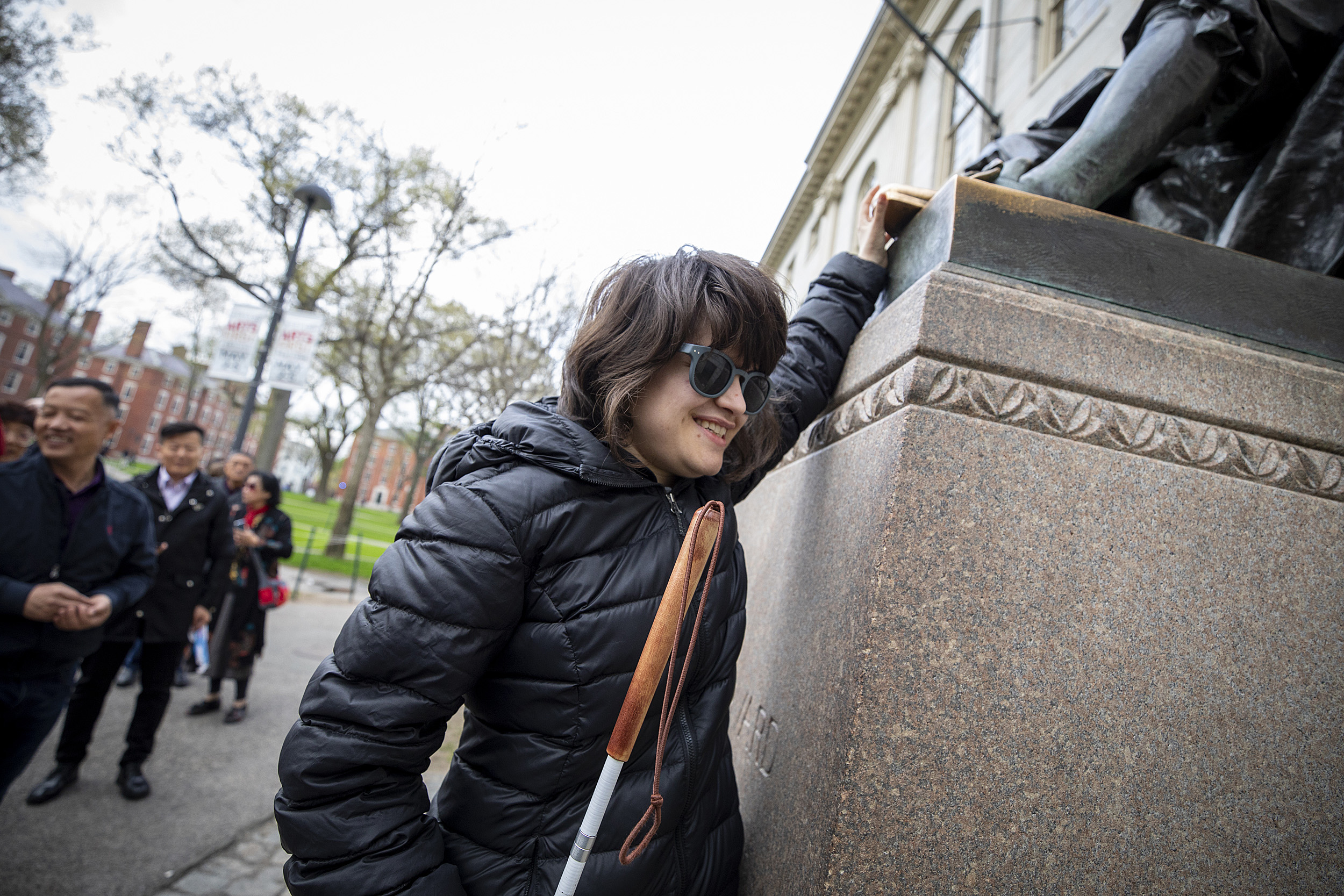
Perkins School for the Blind student Jordan Scheffer, on campus for an intro to psychology course at the Science Center, gets acquainted with the John Harvard statue.
Rose Lincoln/Harvard Staff Photographer
Seeing the light of independence
Perkins School for the Blind and Harvard Extension School team up to help college-bound blind students learn academic and life skills
Upon arriving at Perkins School for the Blind’s College Success program last fall, Steph Brown had never, in 18 years growing up in Stillwater, Minn., crossed a street alone.
“I have no vision whatsoever,” Brown said, and this presented fundamental challenges in school — like getting to the building in the first place and then from class to class, and learning Braille to be able to read along and finish assignments. Often, Brown relied on family and friends to help negotiate some of the everyday tasks that sighted people can take for granted.
As Brown reached high school, it came time to think about college, including the notion of pursuing an education outside of Minnesota. But the prospect of going anywhere alone was already daunting enough. Hurdle after hurdle popped up in Brown’s mind before even beginning to think about what college might be a good fit.
“You know that meme ‘This Is Fine,’ where the dog’s sitting in a room drinking a cup of coffee, smiling, but the surrounding room is on fire?” Brown asks. “I don’t know how many times I’ve said that, you know, that ‘I am fine,’ but felt that way.”
Brown is not alone in feeling like the world is burning, especially when it comes to visually impaired students who are thinking about entering America’s higher education system. According to Perkins, about 60 percent of blind or visually impaired students who pursue postsecondary education programs fail to graduate. The vast leap needed to acquire both academic achievement and independent living skills, which include day-to-day getting around, housework, and time management, is often too great for these young adults to successfully complete.
Perkins is trying to shorten this leap and build bridges to opportunity through College Success, which, in May, graduated its first cohort of eight students from seven states nationwide. In collaboration with the Harvard Extension School, the program prepares students to live on their own for the first time, helping them find the right school and giving them the academic skills they’ll need to stay there.
“You know that meme ‘This Is Fine,’ where the dog’s sitting in a room drinking a cup of coffee, smiling, but the surrounding room is on fire? I don’t know how many times I’ve said that, you know, that ‘I am fine,’ but felt that way.”
Steph Brown, graduate of the College Success program
“There’s not enough time in four years of high school to teach all of the skills necessary to adapt [to an independent higher education experience], and that independence when you’re in college is essential,” explained College Success Director Leslie Thatcher, A.M. ’95. “Introducing these future young professionals to tools that they will use for the rest of their lives, and then empowering them with the confidence and the ability to articulate what their needs and desires are, like every other human being, is the essence of what these nine months is about.”
Another of the impressive eight to complete College Success’ inaugural year is Asheville, N.C., native Jordan Scheffer, an aspiring musician who once took second place at Amateur Night at the Apollo, and who came to Perkins specifically to acquire independent living skills.
“I think when I came in August, I wanted to travel on my own, but wondered, ‘Oh, how do I do this?’” she said. “And I was very nervous. But throughout these nine months I’ve become so much more independent, and I’ve also become more able to express what I need and why I need it, which I’m still working on.” On a recent trip to a nearby mall, an emboldened Scheffer left the group she was traveling with to do some exploring, and shopping, on her own.
Thatcher said both Scheffer and Brown had strong academic backgrounds before arriving at Perkins, yet they both benefited significantly from their first taste of college-level coursework, which they completed at the Extension School. During their first semester, students in College Success enrolled in EXPO-E25, “Academic Writing and Critical Reading,” and they were also able to sign up for electives of their own choosing, both in person and online. Brown took an introduction to fiction writing course that culminated in writing a piece “looking at myself some years into the future,” as well as another class on self and identity; Scheffer signed up for the writing class, as well as a course on grammar. She also took intro to psychology, which she attended at Harvard’s Science Center using Uber to get back and forth from Perkins’ Watertown campus.
Scheffer, who will attend UNC Asheville in the fall, said her favorite project from her Extension School classes required her to analyze people “in public doing something, and to make inferences on why they were doing what they were doing.” To do this, she went to a coffee shop with a sighted friend, and used an app called Be My Eyes to observe fellow patrons by connecting with sighted volunteers.
“I love quote-unquote people-watching,” she explained. “I write creatively, with characters, and it’s fun for me to get to analyze behavior and infer why it’s going on. This, I think, gives me a lot of basis for putting behavior into stories, but also for learning about human beings and why they do what they do in what circumstances. I think that’s really interesting.”
Scheffer approaches the stage in Perkins’ Dwight Hall at last month’s graduation ceremony.
Photo by Michael Brook
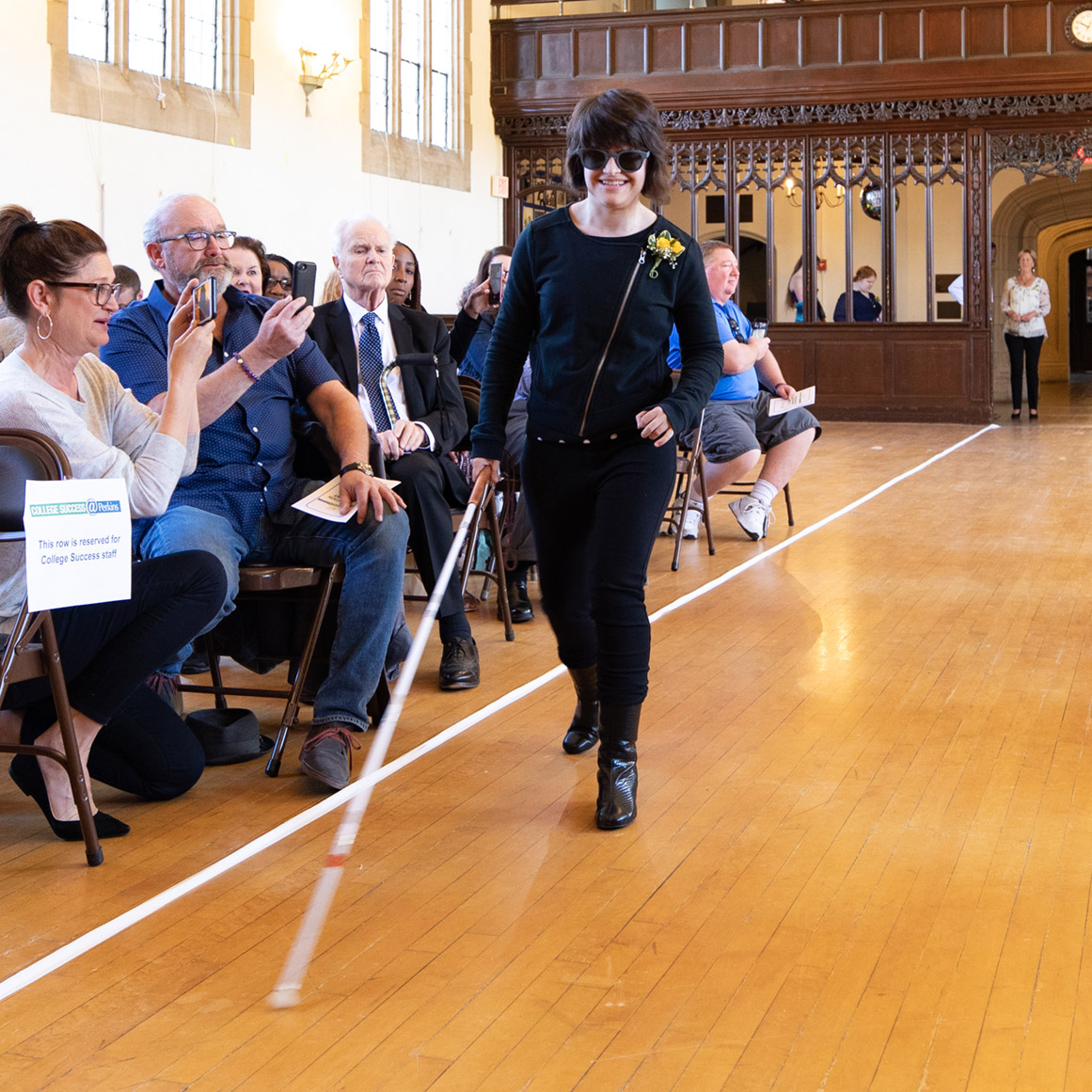
Scheffer, who took several writing classes through the program, talks about her creative process.
Accessibility Services at Harvard’s Division of Continuing Education (DCE) worked hand-in-hand with Perkins throughout the year to make sure class experiences like Scheffer’s were as seamless as possible by ensuring that all cohort members had equal access to courses, providing various formats online (refreshable Braille displays, electronic text, and screen readers, for example), thinking carefully about how students would navigate the physical campus when taking classes in person, and helping them map out the routes. According to DCE Executive Director for Accessibility Services Linda Sullivan, the Extension School regularly provides these services to all students who need them.
“From someone who has been in accessibility services in higher education for a long time,” she said, “it’s so nice to see people thinking about the transition from high school to college. Perkins is taking the necessary steps to help people who may at one time have been considered unable to be successful in school and giving them the chance to say no, they can be successful. This does so much for the students. It means so much for Harvard to be involved, and it makes the world a better place, truthfully.”
“Our relationship with the Extension School has been amazing,” added Thatcher. “The disability service office was extraordinarily supportive, both to us as the team and to the students. And Dean Huntington D. Lambert has been a particularly significant supporter of us from a philosophical standpoint, from a just ‘Let’s make this happen’ kind of attitude which has been really valuable for us. He’s been a great partner. … The classes have been rich, dynamic, challenging opportunities for these students.”
Brown is quick to point to the academic portion of College Success, saying, “Expo 25 showed me that college-level work is very, very different” — and admitting there were some very real learning curves during the year. Still, Brown is flourishing enough to stay in the Boston area this coming year, having been accepted into Lesley University and planning to major in education or psychology.
And by the way, Brown has crossed a street alone and then some, using newfound confidence and budding orientation and mobility skills to successfully navigate the journey from Boston all the way to Provincetown, by bus and ferry.
